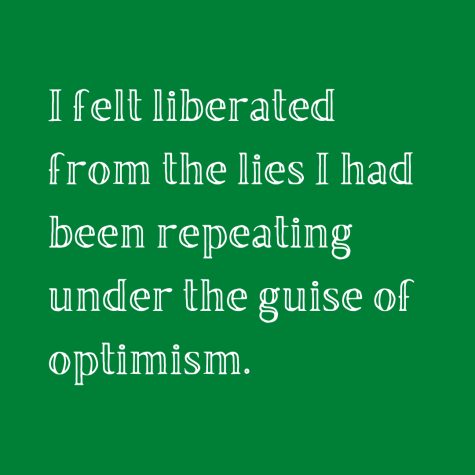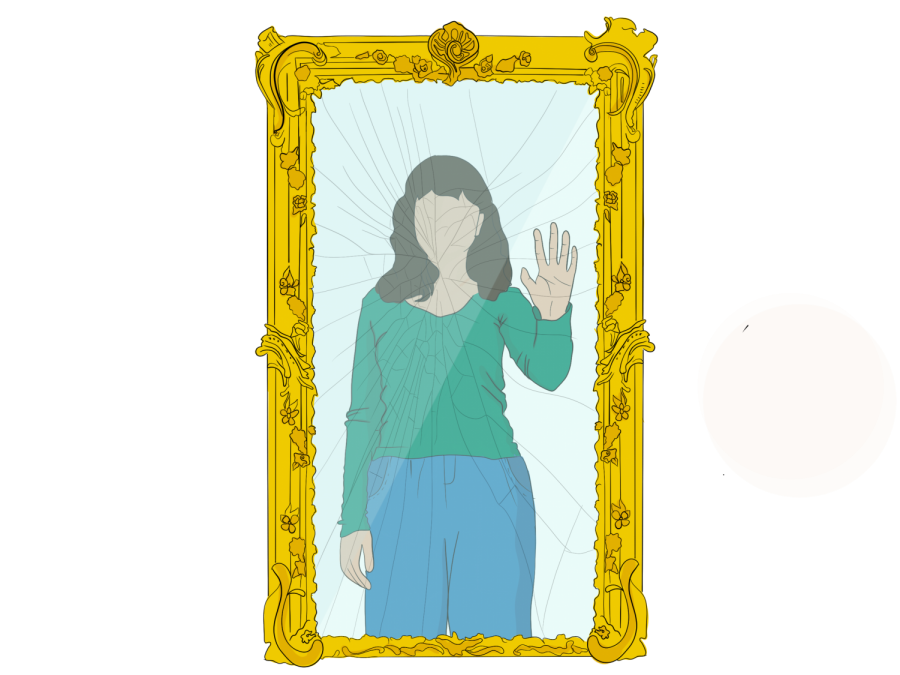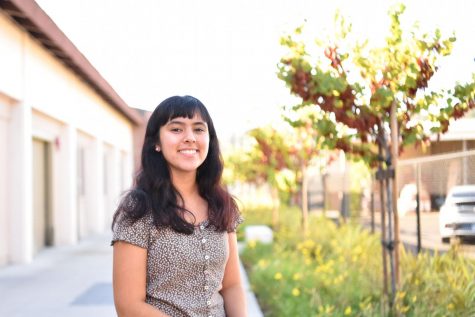In the Mirror: Fake it ’til it breaks
Confronting my toxic positivity this past semester
February 11, 2021
The audience won’t know if you don’t know what you’re doing.”
This is one of the most memorable things my dance teacher ever said. Of course, if you freeze onstage, somebody is bound to notice. But that isn’t what she meant when she made this statement to my tap-dancing class. If there’s one takeaway from tap-dancing, it’s that you need to sound right. Since tap-dancing is based completely on the sounds that come from your feet, if you don’t have the technique down … BS it. As long as you sound like everyone else, the audience will stay oblivious.
I took this lesson to heart. I couldn’t do a toe-up or a six-count pullback, but that didn’t matter — I just had to seem like I could. Even in other aspects of my life, whether it was an impromptu presentation in class or an embarrassing social situation, whenever I didn’t know what I was doing, I just tried to pretend I did. If you can fake it well enough, for a few moments, you can convince even yourself that you’ve got it all figured out.
It’s when those moments turn into months that the trouble really starts.
Here’s a fact: junior year is hard.
I know it. You know it. Your neighbor’s dog knows it. It’s pretty much a universally accepted truth.
And yet, I keep wondering, is it supposed to be this hard?
I’m not even taking seven classes like last year! I’m supposed to have more time and energy. And yet, I have math homework that takes hours more than my course selection sheet promised. Deadlines loom over my head. Spanish has become less of a language and more of the sound that adults make in the Peanuts show. It started to feel normal to get three hours of sleep. Every weekend, I vowed to catch up, to get ahead — only to struggle to finish work in time on Sunday night.
How did this happen? Could I be doing junior year wrong?
I felt hopeless, trapped in a hole I dug for myself. If I hadn’t procrastinated, if I had studied more, if I had figured out my schedule earlier on … My mind spiraled in a circle of blame, and the only person it led to was me.
I hate myself for getting into this mess, I thought.
Everything screeched to a halt.
Here’s another fact: I don’t hate things.
It’s always seemed so cold to hate anything, like your emotions are freezing into something permanent, forever unthawed. It’s always felt like deciding things would never change for the better. But the idea gnawed at me for days.

I don’t hate myself, I thought. I don’t.
I scrambled to find a solution. When things are hard, we’re supposed to count our blessings, right? Well, that was perfect, because I’m a pro at being positive! When those around me longed to go back to how things used to be, I wrapped myself up in the thought that I had friends who cared about me. “It’s hard, but there are still good moments too, which means that everything is fine. At least COVID-19 made school easier this year!” I’d say.
It’s supposed to be hard, I assured myself. Everyone knows that junior year is the hardest year of high school.
But on one particularly overwhelming evening, I burrowed under my bed covers, and in the semi-darkness, finally, I could no longer maintain the facade.
“I hate myself.”
Instantly, I felt an inexplicable lightness. But I couldn’t understand it.
All alone underneath my blankets, whispering that I hated myself — that definitely wasn’t a good thing. So why did my shoulders feel free of a weight I hadn’t realized was there?
The truth is, I hadn’t realized that I had taken my dance teacher’s lesson and applied it to something different. I had spent months — not minutes — forcing positivity, and the only one sitting in the audience was me. Now, I felt liberated from the lies I had been repeating under a guise of optimism.
Because I didn’t want to feel like I was affected by the pandemic, by school, by my home life or feel that I couldn’t handle things or had let it go all too far. I didn’t want to feel like I had caused all my problems myself, and then hate myself for doing that. I didn’t want any of it, but instead of screaming and kicking against the weight of life, I just pasted a smile on my face. It was the easier way out.
But it wasn’t the better one.
Sitting there on my bed in my silent bedroom, I realized that this whole time, I’d been carrying my positivity like a badge of honor, a way of parading around that I was an optimist in spite of it all. But by doing that, I had been invalidating my own feelings. My life was actually kinda sh-tty. And that was … OK.
I guess the real question is, what did I do after that?
To be completely honest … I’m still working on that part. I wish I magically knew how to make things easier and feel better, but I don’t. Does anyone, really? Life goes on, and we do, too. Bad days will always come along with the good. On bad days, thinking life sucks won’t make me a pessimist or a complainer, just like how on good days, looking forward to the future won’t make me ignorant or naive. All we can do is our best, as much as we can, and trust that it’ll be enough.
So I’ll submit to the struggle. I’ll cry enough to put Alice in Wonderland to shame, and then listen to my favorite songs with my friends with the volume all the way up. I’ll ask my guidance counselor for help and advice. I’ll request those extensions. I’ll turn things in late once in a while — because junior year is hard.
But what I won’t do is pretend it’s all fine. I know now that doing that is another weight on top of everything life piles onto us, and it’ll only make things worse.
Living during COVID-19 is hard. High school overall is hard. Actually, life is just hard. By admitting that, we aren’t being weak or cynical. And taking the time to accept our feelings, while difficult, is so worth it. So I’ll save the ‘fake it till you make it’ mindset for any toe-ups in my dance performances, the awkward saves during conversations, or when I haven’t been paying attention in class. The rest of life is much better without it.


















